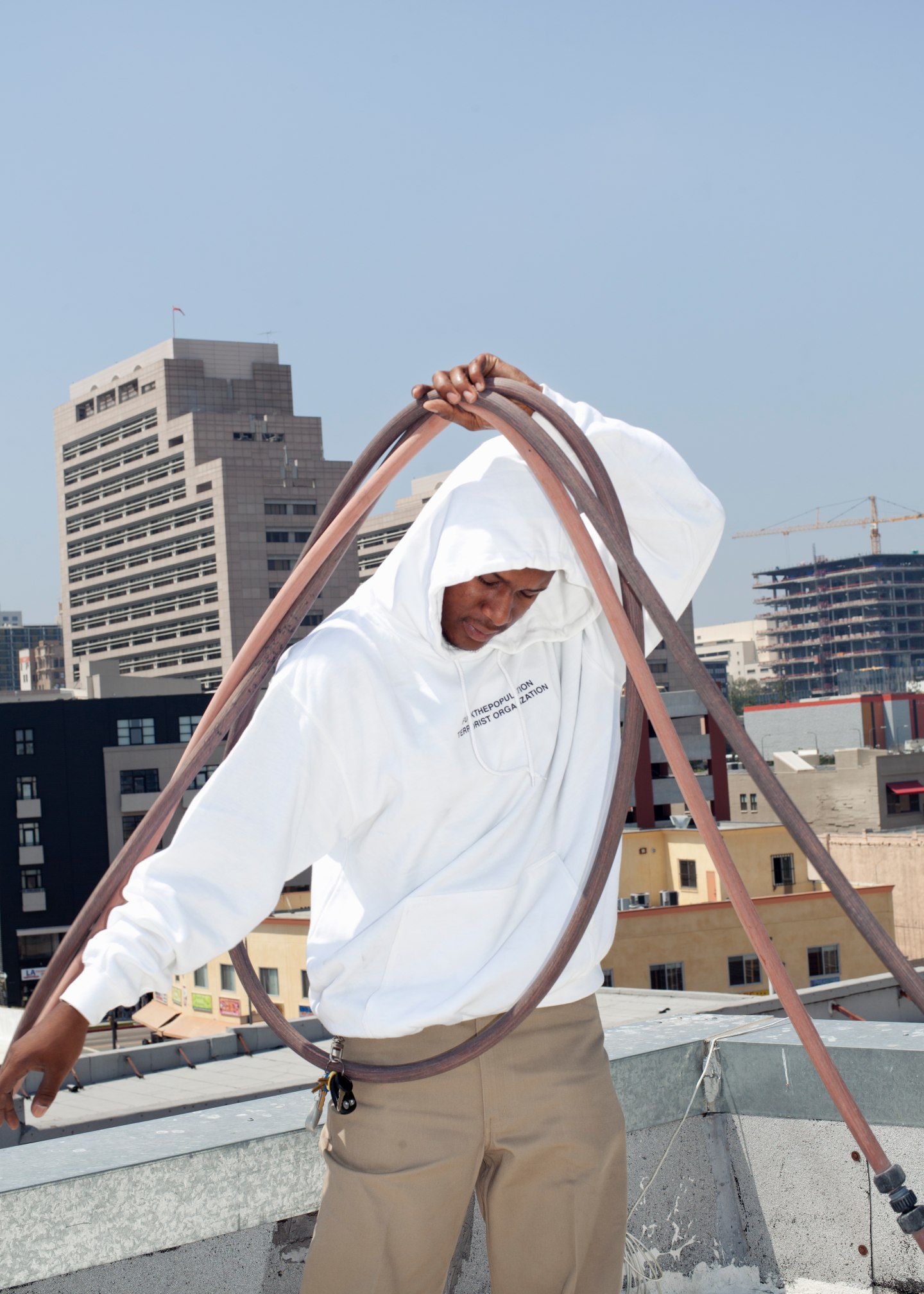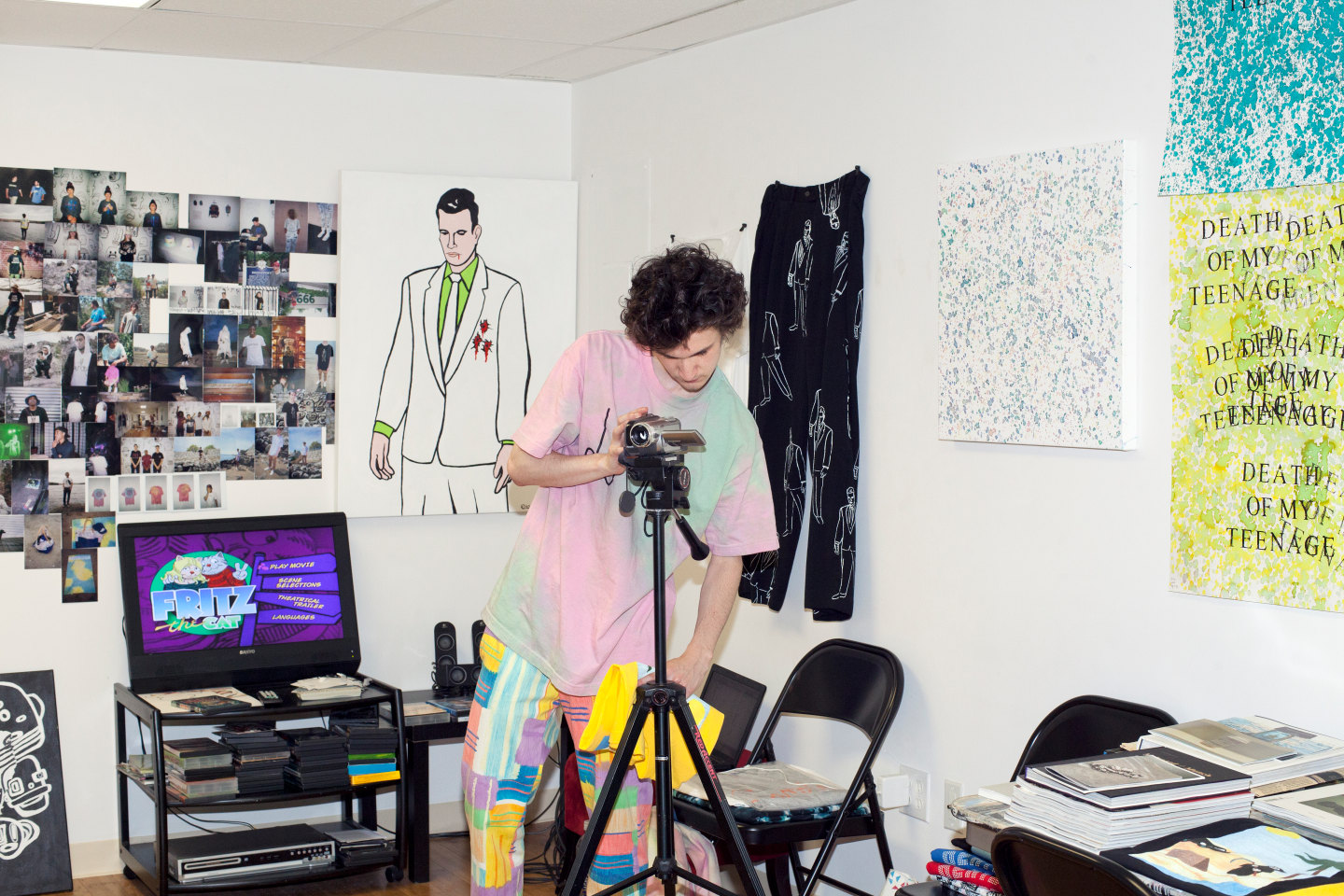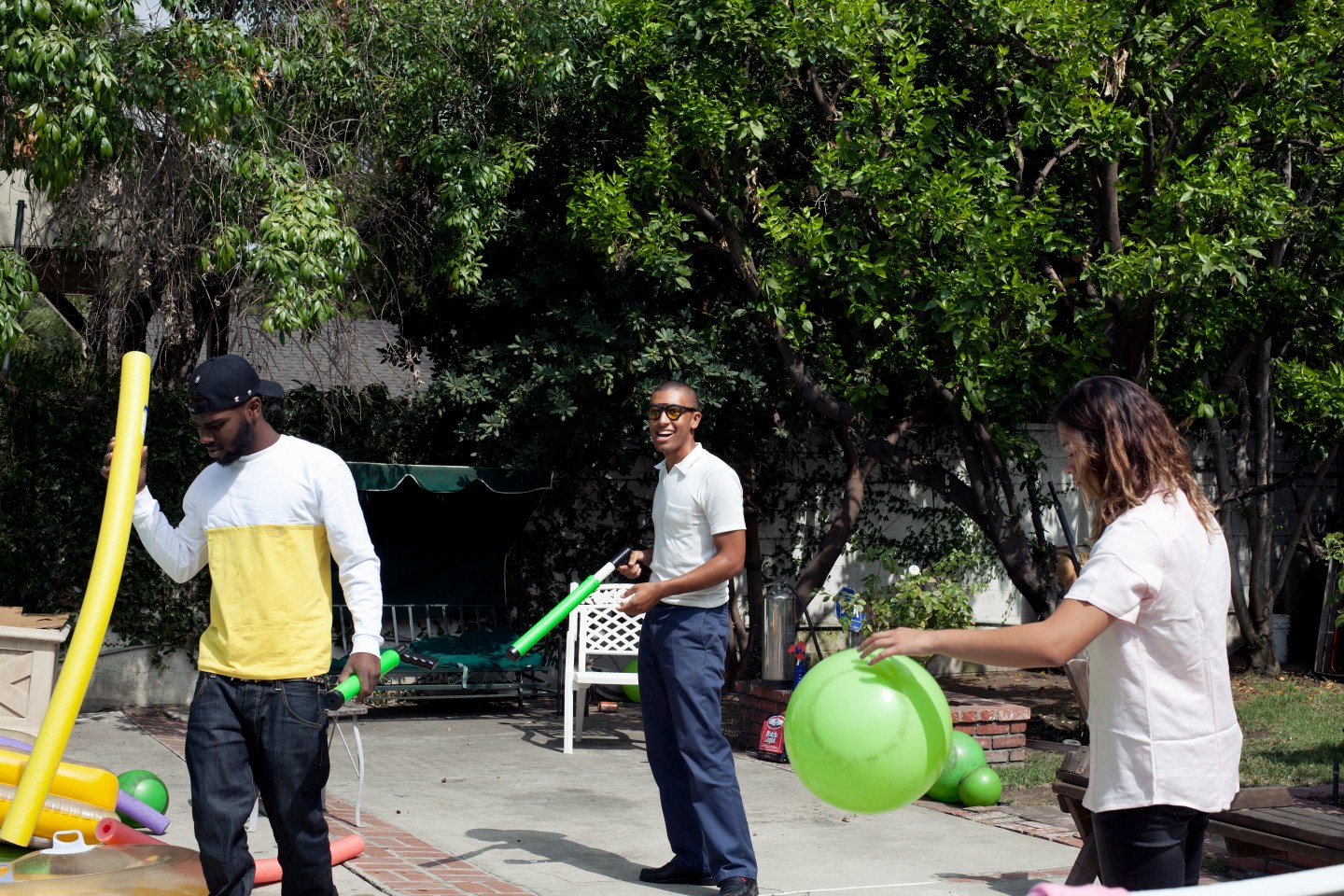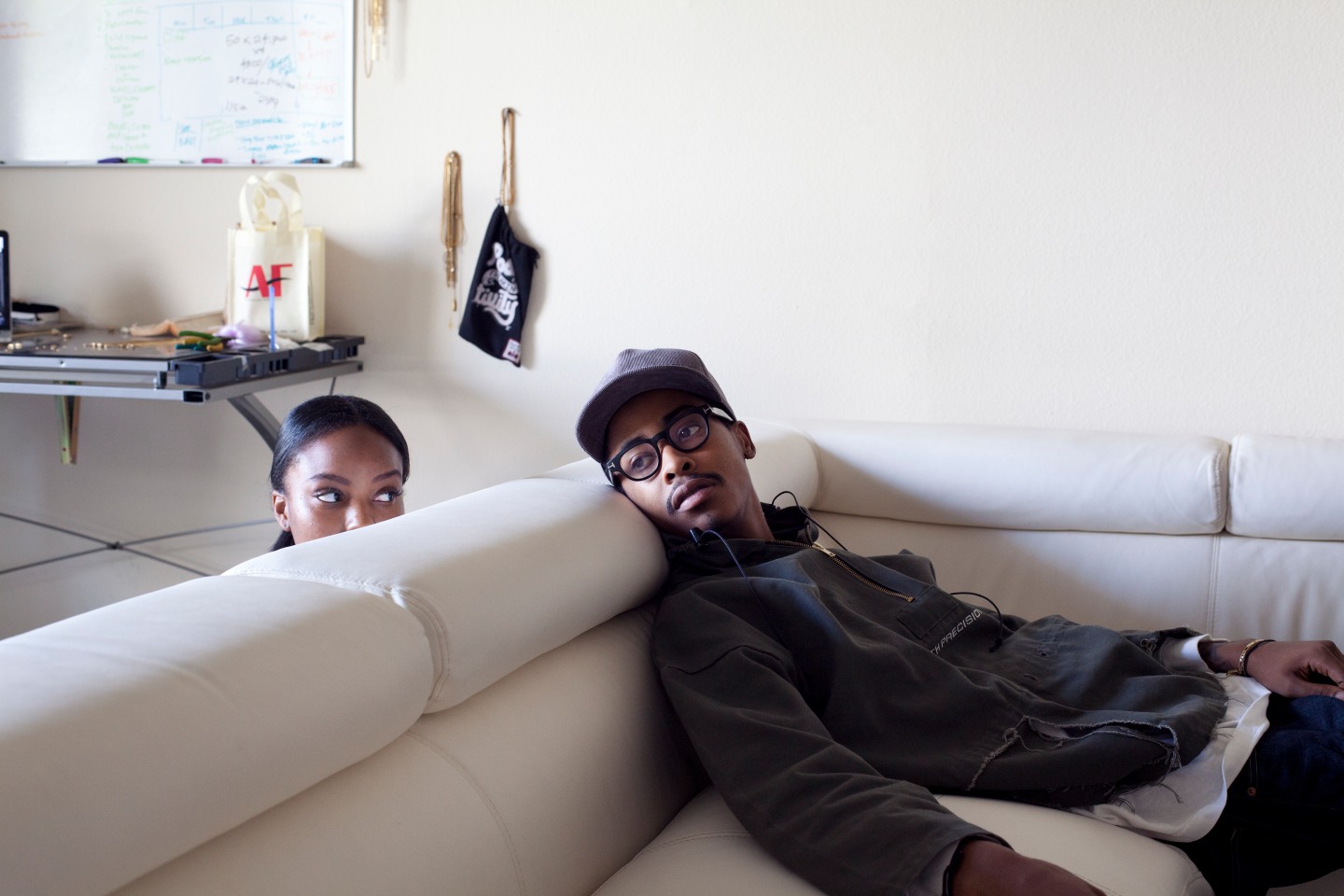Streetwear Sold Out So These Guys Are Going Back To The Beginning
Four young designers are making the kind of cult clothing they once coveted
 Zac Austin Clark, founder of FTP
Zac Austin Clark, founder of FTP
Philip Post has a hunch about his generation. “I think we were the last to really go outside,” the 20-year-old says quietly in New York’s Ace Hotel. His self-designed pink tie-dye T-shirt stands out amid the crowd of trendy young professionals in earthtone button-ups. “When we were kids, we weren’t spending every waking moment online. We still saw life without the internet.”
His observation is apt but ironic: during our conversation, Post reminisces effusively about spending his preteen days lurking message boards that focused on DIY streetwear brands like FUCT and Freshjive. The skaters, writers, designers, and musicians that populated these virtual havens, like Hypeforums and Skateperception, both insulated and inspired preteens like Post, who soaked up game through computer monitors before bringing their ideas out into the real world. “I remember just spending hours looking at stuff, like the ICE CREAM website,” Post says of Pharrell’s then-budding apparel line, “scrolling through stuff I wanted but couldn’t afford.”
In the early 2000s, the streetwear brands Post loved were far enough on the fringes to be unencumbered by market pressures. Diamond Supply Co. ripped off Iron Maiden album covers, The Hundreds called themselves “huge” on T-shirts back when it was still ironic, and Supreme’s brand identity was as standoffish as its Lafayette Street storefront. The tiny universes that grew around these companies offered up a sense of community. “I was always just intrigued by streetwear culture, like having something that you have to know about and do research about to understand,” Post explains.
 Philip Post, founder of Dertbag
Philip Post, founder of Dertbag
But in recent years, streetwear’s air of secrecy has arguably been lost as its styles converged with runway fashion and spread through platforms like Instagram and Tumblr, where hashtags have all but eliminated the hunt. Now, streetwear marketing tactics—like limited quantity releases, loud collaborations, and marked-up resales—are the norm for big names like Nike and H&M. But for all the hand-wringing you could do about the selling-out of streetwear, this current state of affairs has galvanized a batch of young, self-starting designers who are placing a strong brand above all and making great clothes in the process. With irreverent, self-expressive designs buoyed by cult followings, these are labels that won’t be crossing over to runways any time soon, and that’s just the way they like it.
“I’m the type of person that if everyone is going one direction, I just naturally have to go the other,” Post tells me. His Dertbag line, now in its fourth season, subverts New England prep by flipping crisp, private school-ready designs on their heads with tie-dye and embroidery—pieces sport names like Mint Introvert and Yellow Funeral Services. “The town where I went to school was really rich, and I definitely wasn’t,” explains the Norwalk, CT native. “So Dertbag kind of became my way of saying ‘fuck you’ to all of that while pointing out the fact that if you drive ten minutes in this direction, it feels like you’re in another country. I wanted Dertbag to sort of play with the expectation of Connecticut versus its reality.”
On the brasher end of the spectrum is the L.A. brand FTP, short for FuckThePopulation. Many influential labels have drawn on stark imagery to make statements, but few have pushed the envelope as far as FTP. Their latest collection of tees and rugbies is a series of unabashedly offensive designs—serial killer tributes and illustrations of how to use a condom—that remind passersby that it’s still possible for a brand to not give a fuck. One white tee emblazoned with the words “Terrorist Organization” even caught the attention of Homeland Security: the brand’s founder, Zac Austin Clark, says they mailed him a letter ordering him to halt production of the shirt and shut down his PayPal account. Whether his designs scan as brave or baiting, Clark insists they’re nothing more than a singular expression of his vision, a trait he sees as essential to true streetwear. “That’s what I’m always going to be about,” he says over the phone from his Skid Row office space. “Just making the shit that I want, and selling it to people who actually fuck with it.”
 Mikey Alfred, founder of Illegal Civilization
Mikey Alfred, founder of Illegal Civilization
The foul-mouthed 21-year-old started making clothes in fifth grade, when he sold candy to classmates to fund his first collection: T-shirts with hand-drawn middle fingers stitched onto them. “I just always knew I needed to be making shit,” Clark says. “All these brands now are doing this colorful Zumiez played-out shit, and I just feel like they don’t deserve to be where they’re at.” On the day we speak, someone spray-paints a giant “FTP” tag over a Fairfax billboard for the label Pink Dolphin. Clark denies any involvement with the act of vandalism, but stands behind the sentiment, saying he welcomed a flood of praise from supporters when images of the tag went viral. “That shit just feels so forced,” he says of the label. “I can’t stand it.” Clark points to a crucial qualifier in streetwear design: a reverence for rawness. “That’s the beauty of doing this without a business partner or some big distribution deal: you can just do whatever the fuck you want,” he says.
Or as Illegal Civilization’s founder Mikey Alfred puts it: “Stop trying so hard to be cool and go outside.” A peripheral friend of the L.A. collective Odd Future, Alfred got his start in fashion almost by accident, after filming a string of brash skate videos that maintained the same agitating edge that made the rap crew famous. “We were making these skate videos for a long time, and they started getting a bunch of views,” he explains. “We wanted to go to New York so bad, just to see it and shit, but we had no money. So we were like, ‘Let’s sell some shirts.’”
“That’s the beauty of doing this without a business partner or some big distribution deal: you can just do whatever the fuck you want.”—Zac Austin Clark
Illegal Civilization’s initial designs reflected this spur-of-the-moment attitude, with crude illustrations that looked like they were sketched in an afternoon. But over time, the brand has moved into making visors, prints, polos, and more sophisticated shirt patterns. Alfred’s latest collection is full of creased apparel, like dress pants and bright pink button-downs. When I meet him in Manhattan, he’s wearing a white polo with the Illegal Civilization logo embroidered on the chest—“Grown man shit,” as he calls it. “This new collection is just a reflection of where I’m at in my life,” he says. “I just turned 20, so the clothes I’m gonna be making now are gonna look different.” Following a string of well-attended art shows in L.A. and pastel collections of summer essentials, Alfred is determined to play things close to the chest. “We get offers all the time to put our shit in big stores or whatever, but that’s not what we’re about,” he says. “I think if you make clothes just to make a ton of money, you’re wack. I didn’t come into this thinking about blowing up; I just make the things that I’d want to wear.”
 Jakobi McLemore, founder of Death Precision
Jakobi McLemore, founder of Death Precision
Jakobi McLemore, the 21-year-old Houston native behind Death Precision, likes flying under the radar because it helps him maintain a tight design edit. “As an independent brand, it’s easier to make what you really want to make [when] you don’t have to make twenty-thousand different pieces,” he says. “The people buying it can feel like they’re really part of something.” Death Precision’s latest collection, the first run of new clothes for the brand in two years, is full of delicate, intentional pieces that warrant fanatic collecting: a pullover jacket reminiscent of ’90s Ralph Lauren, headbands fit for a Wes Anderson film, and even a velour track jacket. Jakobi also plans to publish a lifestyle magazine called What’s More Precise, intended to give exposure to other small brands operating on a budget. “I want to build that type of community we had early on,” he explains. But nostalgia aside, Jakobi’s driving force is still making each piece feel new. “If I can make every collection I do different than the last, then I’m good. The people who have been with me from the beginning will always be there because they get something different.”
Despite the strides these four designers have made selling cotton out of bedrooms so far, a rundown of their long-term goals makes the dedication that sets these kids apart clear: Philip Post wants to do a Dertbag line threaded through his blood to represent his long battle with Crohn’s disease. Clark hopes to open a store on Skid Row, with a passcode that only fans who truly follow the brand will know. Mikey Alfred is working on a TV pilot. All of these kids grew up watching brands build a community in real time, and they’re refreshingly committed to continuing that tradition. “Mad people have brands with hella Instagram followers or whatever, but you never see anybody wearing it,” Alfred explains. “If you really want to do shit, you have to connect with people in the real world.”